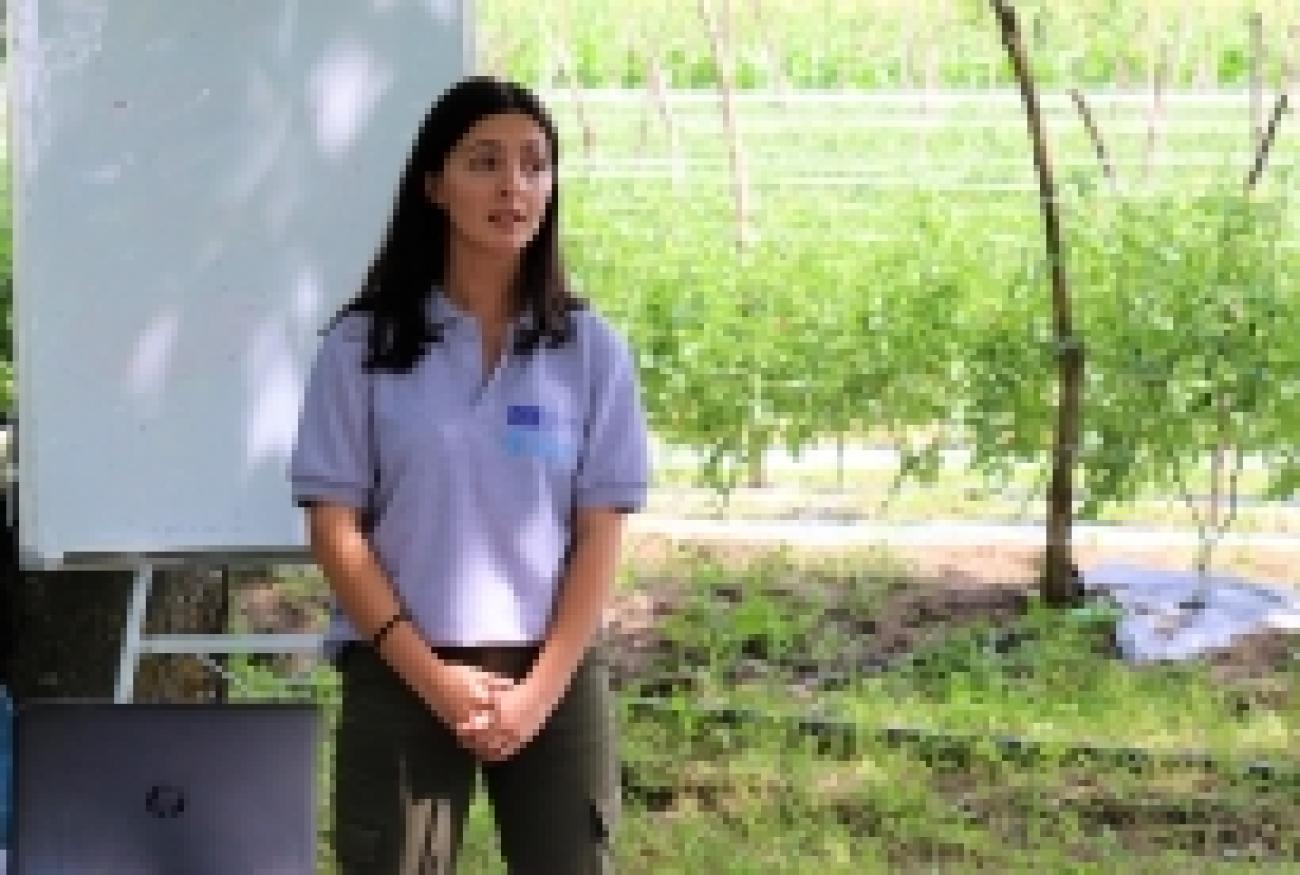“I was never afraid of hard physical work, or getting dirty, you can’t be an agronomist if you are,” says 24-year-old Meri Bekauri, an agronomist from Rustavi, a town near the Georgian capital, Tbilisi. Starting her work three years ago as an intern of the EU and FAO Internship Programme for Young Agronomists, one year later she became FAO employee. Meri has already worked on 26 farmer plots, helping up to 100 farmers grow vegetables, fruits salad greens and other agricultural crops in four different municipalities of Georgia.
The profession of an agronomist is not among the top desired specialties among Georgian youth, the pool of professionals ages rapidly, - “There were only eight of us on the faculty, when I have entered the Agrarian University,” Meri says, also noting that her decision to study this field surprised her friends and family, but she never regretted it.
‘’Differing from a lot of other professions, the agronomy can be very rewarding – one advises farmers how to grow more, grow better and, in many cases, next season you can see better crops on farmer’s fields, you see them doing the right thing, even without your guidance,” Meri states.
Meri Bekauri was one of several agronomy students, who took part in FAO internship programme by the end of her studies in the university. As she states, the university gave the students valuable theoretical knowledge on the subject but didn’t provide enough practical experience in the field.
“As I have joined the EU and FAO internship programme, I immediately relocated to a village, had to spend weeks and months working the plots, I have learned so much from the farmers,” she says.
Being a member of the FAO team, Meri Bekauri was tasked with introducing modern agricultural solutions to Georgian farmers. Mulching, beds formation and other smart and conservation agriculture methods, such as drip irrigation, were new to many producers in rural Georgia and the innovation had its challenges.
“It’s always hard to bring something new to the farmers, especially when you are a young person from the city, training the farmers whose families worked the land for generations. What can this tiny girl teach us? – This kind of a reaction was not rare amongst the farmers I worked with,” Meri recalls.
According to Meri, the key to gain the farmers’ trust was hard work and dedication. When the farmers saw her not being hesitant to dig into the soil and get blisters from installing irrigation systems, she gradually gained their respect and confidence.
“I can frankly say we doubted Meri when we saw her for the first time. But as the time went by and I saw the transformation of my plot, I stopped doubting her. I managed to double my tomato production by 2021, and I can’t imagine doing that without Meri’s help,” Nino Kakichashvili, a female farmer from Akhmeta municipality in Eastern Georgia says.
Being a female agronomist also added to the challenges, Meri says. As most of the agronomists in the villages are men, farmers are not used to seeing women specialists often. However, as more and more women started their own agricultural production, Meri found it easier to find a common ground with them and male farmers alike.
“Georgia still suffers from the lack of expertise in agriculture, we need more young agronomists to provide the access to knowledge to the farmers. We need more women in the field, as there are more women in agriculture than before, and they suffer from the lack of access to information more than men. These reasons are behind FAO’s internship programme for young agronomists,” Javier Sanz Alvarez, FAO Programme Coordinator, stated.
Meri Bekauri states that despite challenges, she sees more women attending agricultural training provided by FAO and other international organizations.
“Women were always a huge part of the agricultural production in Georgia, doing as much hard work as men, however now, rural women are starting their own production and are in need of expertise and advice that agronomists can provide”.
The young agronomist also notes that the interest of the youth in the field of agronomy grows as well. “By the time I graduated from the university in 2019, the number of freshmen in the agronomy department increased four times. I hope this process will continue and more young men and women will realize how rewarding this profession can be,” Meri concluded.
With the EU support FAO , started the internship programme for young Georgian agronomists back in 2019. Up to 20 agronomy graduates and undergraduates participated in the programme. The one-year paid internship is targeted to support Georgian farmers in the introduction of modern agricultural methods and best practices.
The EU is supporting agricultural and rural development in Georgia through its ENPARD Programme. Implemented since 2013 with a total budget of EUR 234.5 million, the main goal of ENPARD is to reduce rural poverty in Georgia.






